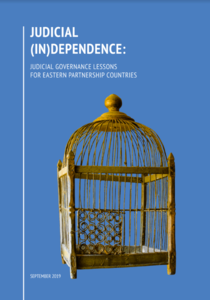
Judicial (In)Dependence: Judicial Governance Lessons For Eastern Partnership Countries
This Report is dedicated to the research on the outcomes of activities of judicial governance agencies’ tasked with recruitment of judges and review of complaints on disciplinary violations committed by judges in Eastern Partnership countries, which are all characterized by economies in transition and totalitarian Soviet past. The report aims at providing recommendations on approaches to the formation of judicial governance agencies in those countries.
For this purpose, we have analyzed the experience of such agencies in Moldova, Georgia, and Ukraine.
Since 1991, there have been numerous attempts at judicial reforms in those countries, both isolated and comprehensive. The most recent reforms have all been based on the principle that the majority of members in judicial governance agencies should be selected by the community of judges.
The main assessment criteria for the performance of judicial governance agencies for the purposes of this report are the level of public trust in judges in those countries and expert opinions on the independence of those agencies from political influence, their objective and effective fulfillment of their functions, and their compliance with public expectations for reforms of the judicial branch.
Source: Civic Synergy Project